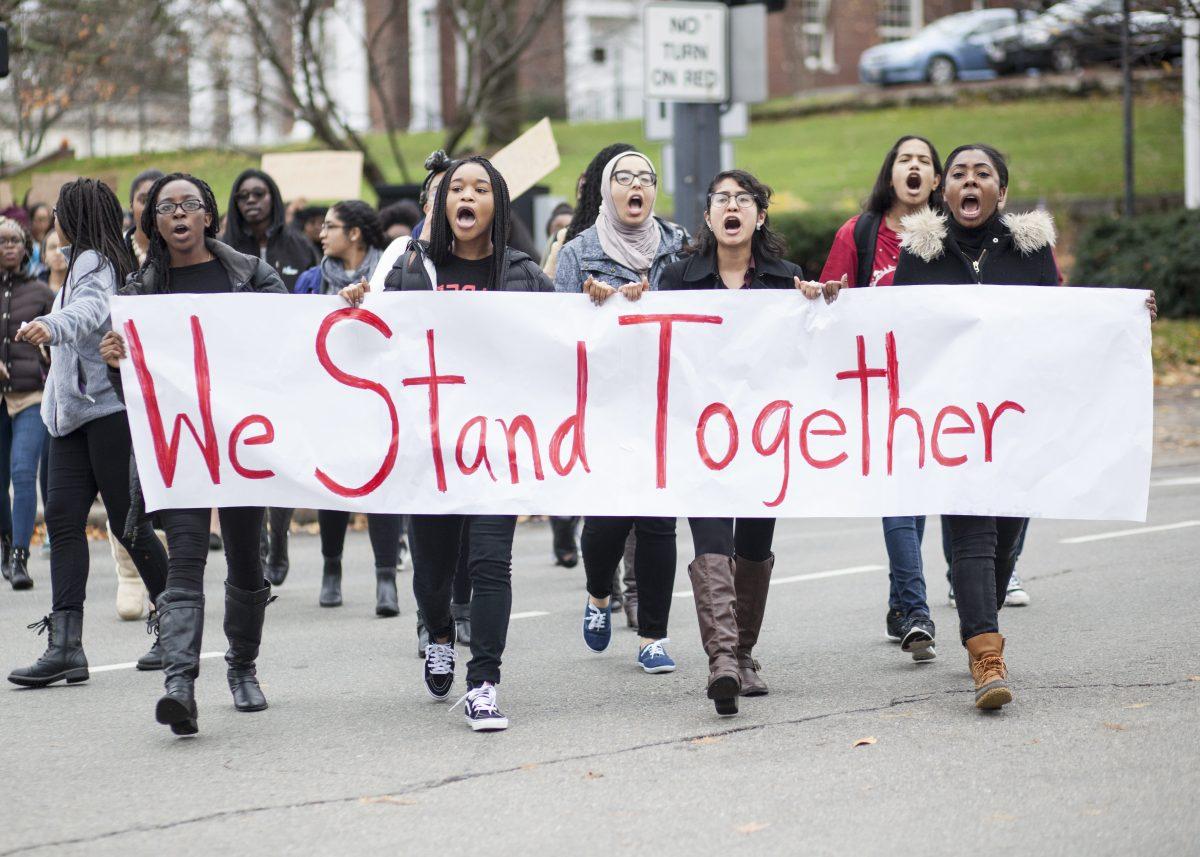On Nov. 16, Wellesley College and Babson College held a solidarity march. Over two hundred people from each campus marched to Morton Park in the town of Wellesley and gathered to listen to speakers who shared the common theme of transcending hate.
The march comes in light of an incident that occurred at Wellesley on Nov. 9, when two Babson students drove onto campus and began to harass students with cries of support for Donald Trump. They purportedly singled out students of color and even spat at a student who requested that they leave.
The march was organized by students from Wellesley. Susan Reverby, a Women and Gender Studies’ professor, explained her department’s role in the march.
“The rally was entirely organized by students . . . my department and I supported some of the student organizers by speaking to them about what they were planning, and letting other faculty/staff know about the march.”
Alexa Rodriguez ’17, a principal organizer of the event, explained that organizing the march made her feel productive.
“The day after the hate crimes, and the week following the elections I felt a lot of sadness and frustration. I wanted to turn those feelings into something productive. I wanted to make Wellesley feel like a safe space for my siblings and I again. I came up with the idea of a peace walk when talking to one of my closest friends.”
Many organizers of the march emphasized the importance of bringing the community together. Amina Ziad ’17, another principal organizer, also noted that bringing students of color in particular to the forefront of the march was another goal.
“We did our best to think thoughtfully about what we wanted the demonstration to accomplish and to very clearly center students of color, particularly Black students, in our planning. My specific tasks focused on coordinating with Babson students, and I also took the lead on communication with the Harambee House orgs and making sure their concerns were centered and being met.”
Many participants thought the march was successful in bringing both communities together. Reverby commented on the inspiration that the march evoked. “As we waited outside the college club, having no idea how many people would come, it was just amazing to see the students, alumnae, faculty, administrators and staff who joined us by the hundreds. It was really inspiring. When the students/staff from Babson walked in I was in tears. It is this kind of support and organizing that matters to give us a sense of collective purpose and resistance to undermining equality.”
Ziad found that the march reinforced her belief in the Wellesley community, commenting that “seeing my professors, my peers, my friends, staff members from ORSL, the KSC, and so on, was a testament to our dedication as a community to maintaining Wellesley as a space that promotes equity and justice.”
Rodriguez echoed these sentiments, stating that “the march was extremely successful. It felt so wonderful to have such a great turnout. You could almost physically feel the support and love we had for one another. When Babson came in, it felt like such a force of positivity. I appreciated all of the staff and faculty support. It was particularly meaningful because I think that actions speak louder than words, and the people present in that march gave me hope for a better tomorrow. There are good people out there, we just have to remind ourselves of that reality and the rally did just that.”
Reverby believes that there is still work to be done beyond what the march accomplished. She emphasized the importance of future collaboration with Babson.
“Continuing to support students/faculty/staff here at Wellesley and Babson in more concrete ways will really matter into the future. It would be useful to have joint programming, to consider not just being reactive but active in protection of our rights.”
Considering next steps beyond the rally, Ziad emphasized the conversational and political attitude that the march inspired.
“Moving forward, I hope that we continue to have the conversations that we’ve been having around institutionalized racism, white supremacy, sexism, etc. I hope that we all take the time to educate ourselves on the struggles of our peers and the struggles of the communities to which we belong. I hope that white allies work to recognize the privileges they have, and work towards using those privileges to speak out against injustice. In terms of concrete things we as a community can do now, we can sign the petition initiated by several professors to designate Wellesley as a sanctuary campus or donate to the #NoDAPL movement.”






